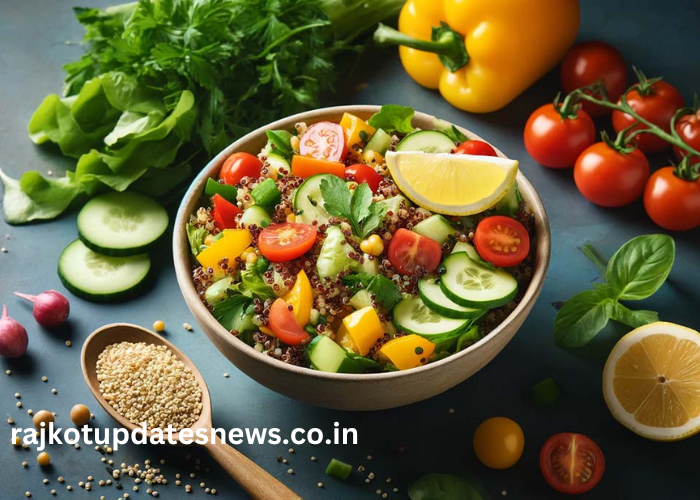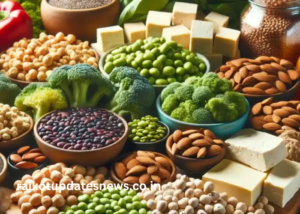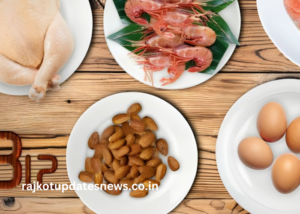
In today’s world, the popularity of vegetarianism is on the rise. Whether driven by health concerns, ethical considerations, or environmental awareness, many individuals are choosing to eliminate meat from their diets. However, a common question arises: how do vegetarians ensure they are getting enough protein? The answer lies in a variety of nutrient-dense foods that are rich in protein. Wellhealthorganic.com: Rich Protein Food for Vegetarians serves as a valuable resource for those looking to explore plant-based protein options.
In this blog post, we will dive into the importance of protein, explore rich sources of protein for vegetarians, and answer common questions about incorporating these foods into your diet.
Why Is Protein Important for Vegetarians?
Protein is an essential macronutrient that plays a critical role in the body. It is vital for building and repairing tissues, making enzymes and hormones, and supporting overall health. For vegetarians, ensuring adequate protein intake is crucial, especially since they may miss out on some protein-rich animal products.
The recommended dietary allowance (RDA) for protein is approximately 46 grams per day for women and 56 grams per day for men. However, individual needs may vary based on age, activity level, and health status. Understanding the importance of protein and the best sources for vegetarians is key to maintaining a balanced diet. Wellhealthorganic.com: Rich Protein Food for Vegetarians highlights the significance of including sufficient protein in daily meals.
What Are the Best Sources of Protein for Vegetarians?
When it comes to vegetarian sources of protein, there are numerous options available. Some of the richest sources include:
- Legumes: Beans, lentils, and chickpeas are packed with protein and fiber. For instance, one cup of cooked lentils contains about 18 grams of protein. Legumes can be easily incorporated into soups, stews, and salads.
- Tofu and Tempeh: Both tofu and tempeh are derived from soybeans and are excellent sources of protein. A half-cup of tofu provides approximately 10 grams of protein, while tempeh offers around 15 grams. They are versatile ingredients that can be used in various dishes, from stir-fries to sandwiches.
- Quinoa: Often considered a superfood, quinoa is a complete protein, meaning it contains all nine essential amino acids. One cup of cooked quinoa contains about 8 grams of protein, making it an excellent base for salads and grain bowls.
- Nuts and Seeds: Almonds, chia seeds, hemp seeds, and pumpkin seeds are not only high in protein but also healthy fats. For example, two tablespoons of hemp seeds contain around 10 grams of protein. They can be added to smoothies, yogurt, or salads for an extra protein boost.
- Dairy Products: For lacto-vegetarians, dairy products like Greek yogurt, cottage cheese, and milk are rich in protein. A serving of Greek yogurt can provide over 15 grams of protein. Dairy products can be consumed alone or incorporated into various recipes.
- Eggs: For those who consume eggs, they are an excellent source of protein, with one large egg providing about 6 grams. Eggs can be prepared in various ways, including boiled, scrambled, or as omelets.
- Vegetable Protein Powders: Plant-based protein powders, such as pea protein or brown rice protein, can be added to smoothies or baked goods to enhance protein content. They are especially useful for athletes or those looking to increase their protein intake quickly.
By diversifying the sources of protein, vegetarians can easily meet their daily protein needs. Wellhealthorganic.com: Rich Protein Food for Vegetarians emphasizes the importance of variety in achieving a balanced diet.
How Can Vegetarians Incorporate More Protein into Their Diets?
Incorporating rich protein food into a vegetarian diet can be both simple and enjoyable. Here are some practical tips:
- Plan Meals Around Protein: Start with a protein-rich base, such as legumes or tofu, and build meals around them. For example, create a hearty lentil stew or a quinoa salad loaded with vegetables and seeds.
- Snack Wisely: Choose protein-rich snacks like Greek yogurt, nut butter on whole-grain toast, or roasted chickpeas. These options not only satisfy hunger but also contribute to daily protein intake.
- Experiment with Recipes: Explore new recipes that highlight plant-based proteins. Dishes like chickpea curry, tofu stir-fry, or quinoa bowls can make meals exciting and nutritious.
- Include Protein in Breakfast: Start the day with protein-rich breakfast options. Smoothies made with protein powder, oatmeal topped with nuts, or scrambled eggs with spinach can kickstart your protein intake early in the day.
- Supplement When Necessary: If dietary restrictions make it challenging to meet protein needs, consider protein supplements. Consulting with a nutritionist can help determine if this is a suitable option.
By making small adjustments and focusing on high-protein ingredients, vegetarians can enhance their diets significantly. Wellhealthorganic.com: Rich Protein Food for Vegetarians provides further guidance on meal planning and preparation.
Is It Possible to Get Enough Protein from a Vegetarian Diet?
Yes, it is entirely possible to meet protein needs on a vegetarian diet. With careful planning and a focus on diverse protein sources, vegetarians can consume adequate amounts of protein for optimal health.
Research shows that plant-based diets can provide sufficient protein, especially when they include a variety of protein sources throughout the day. It is essential to combine different protein sources to ensure all essential amino acids are consumed.
Wellhealthorganic.com: Rich Protein Food for Vegetarians supports this by offering practical advice and resources to help vegetarians maintain a balanced diet.
What Are the Nutritional Considerations for Vegetarians?
While protein is essential, vegetarians should also pay attention to other nutrients that may be less abundant in their diets. Some key nutrients to consider include:
- Iron: Plant-based sources of iron, such as lentils, chickpeas, and spinach, may not be as readily absorbed as iron from meat. Pairing iron-rich foods with vitamin C sources, like citrus fruits, can enhance absorption.
- Vitamin B12: Since B12 is primarily found in animal products, vegetarians may need to consider fortified foods or supplements to ensure adequate intake.
- Omega-3 Fatty Acids: Vegetarians can obtain omega-3s from flaxseeds, chia seeds, and walnuts, but may also consider algae-based supplements for DHA and EPA, the essential forms of omega-3.
- Calcium: Dairy products are excellent sources of calcium for lacto-vegetarians, but plant-based sources like fortified plant milks, tofu, and leafy greens can also help meet calcium needs.
By being mindful of these nutrients and incorporating a variety of foods, vegetarians can maintain a well-rounded and nutritious diet. Wellhealthorganic.com: Rich Protein Food for Vegetarians provides additional insights on essential nutrients for vegetarian diets.
How Do Plant-Based Proteins Compare to Animal Proteins?
The main difference between plant-based and animal-based proteins lies in their amino acid profiles. While animal proteins are typically complete proteins, providing all essential amino acids, many plant proteins are considered incomplete. However, by combining different plant protein sources, such as beans and rice, vegetarians can create complete protein profiles.
Additionally, plant-based proteins often come with added benefits, such as fiber, vitamins, and minerals, while being lower in saturated fat. These qualities can contribute to better health outcomes when consumed as part of a balanced diet.
Wellhealthorganic.com: Rich Protein Food for Vegetarians explores these comparisons in detail, helping individuals make informed choices about their protein sources.
Can Protein Help with Weight Management for Vegetarians?
Protein plays a crucial role in weight management for vegetarians. High-protein diets can promote satiety, helping individuals feel fuller for longer and reducing overall calorie intake. Incorporating rich protein foods into meals and snacks can make it easier to control hunger and cravings.
Moreover, protein has a higher thermic effect than carbohydrates or fats, meaning the body burns more calories digesting protein. This aspect can further support weight management goals.
By focusing on rich protein food, vegetarians can create satisfying meals that help manage weight effectively. Wellhealthorganic.com: Rich Protein Food for Vegetarians encourages incorporating protein-rich foods into weight loss strategies.
Conclusion
In conclusion, incorporating rich protein food into a vegetarian diet is not only feasible but also beneficial for overall health. With an abundance of options available, vegetarians can easily meet their protein needs while enjoying diverse and delicious meals. Understanding the importance of protein, exploring various sources, and addressing nutritional considerations are vital for maintaining a balanced diet.
By referring to wellhealthorganic.com: Rich Protein Food for Vegetarians, individuals can find guidance and inspiration for their plant-based protein journey. Embrace the power of vegetarian proteins, and embark on a healthy and satisfying lifestyle!


